
This exceptionally small lot of Peaberry SL28 from Gerald’s farm, Kambarare, produced one of the highest-scoring Kenyan coffees in recent memory. Its profile differs slightly from the AA/AB separation. In the cup we find a more tropical and complex profile of mango, lychee, blackcurrant, and hibiscus.
SL28
Kirinyaga
1,950 masl
November, 2024
Harvested at peak ripeness. Hand-sorted and floated to remove defects. De-pulped on the day of harvest, then mixed for uniform distribution. Dry-fermented in darkness for 18–20 hours, washed, and turned repeatedly in fresh water until the water runs clear. Fermented dry for an additional 24 hours, washed again, and floated through channels to sort by density and remove remaining defects. Dried on raised beds under shade nets until moisture reaches 16%, then moved to upper beds to finish drying to ~10.5%.
ABOUT GERALD NJAGI
Gerald Njagi is a third-generation coffee producer who began his own farm, Kambarare, in 2011 by leasing his first 100 trees. Today, he manages much of the Kambarare estate and oversees all post-harvest processing. As a family, they now own a total of 1,000 trees and continue to build on their legacy of quality coffee production.
ABOUT RETRO 1984
This is the first year of Retro 1984—a collaborative project between Peter Mbature, Tim Hill, and SEY, born from years of conversations and a shared concern about the declining quality of Kenyan coffees. This effort is an active step toward asking better questions and conducting meaningful experiments to help revive the flavor profiles we all once knew and loved. The name Retro 1984 references the year just before the introduction of the hybrid variety Ruiru 11 in Kenya. At its core, this project is about returning to SL variety separations and exploring their full potential. We believe deeply in the future of Kenyan coffee, and this is one of the most exciting projects we have ever been a part of—driven by our enduring love for these profiles.
ABOUT SL28
The “SL” in SL28 refers to single-tree selections made by Scott Agricultural Laboratories between 1935 and 1939. A member of the Bourbon genetic group, SL28 was selected for its drought resistance and outstanding cup quality. It remains one of the most well-regarded varieties in Africa and has since spread from Kenya to other parts of the continent, as well as Central and South America. A non-hybrid variety, SL28 is highly susceptible to disease.
Pricing Details
FARM GATE (USD; GREEN)
$13.21/KG
FOB
$15.85/KG
FOT
$18.98/KG
The cost of getting a coffee from cherry to beverage varies enormously depending on its place of origin and the location of its consumption. The inclusion of price transparency is a starting point to inform broader conversation around the true costs of production and the sustainability of specialty coffee as a whole.